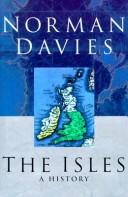Check nearby libraries
Buy this book

"The Isles is a revolutionary narrative history that takes a new perspective on the development of Britain and Ireland, looking at them not as self-contained islands, but as an inextricable part of Europe.".
"At the early stages, The Isles connects offshore development with parallel events on the Continent. This richly layered history begins with prehistory and the Celtic Supremacy in the last centuries B.C., which is presented in the light of a Celtic world stretching all the way from Iberia to Asia Minor. Roman Britain is seen not as a unique phenomenon but as similar to the other frontier regions of the Roman Empire, such as Germany.
The Viking Age is viewed not only through the eyes of the invaded but from the standpoint of the invaders themselves - Norse, Danes, and Normans. Plantagenet England is perceived, like the Kingdom of Jerusalem, as an overseas extension of medieval France.
In the later chapters, Davies follows the growth of the United Kingdom and British Empire and charts the rise and fall of the main pillars of "Britishness" - the Royal Navy, the Westminster Parliament, the constitutional monarchy, the aristocracy, the Protestant supremacy, the Civil Service, law, the imperial economy, the sporting tradition, and the English language." "The book ends with the crisis confronting Britain now - the emergence of the European Union."--BOOK JACKET.
Check nearby libraries
Buy this book

Previews available in: English
Subjects
England, Scotland, Wales, Ireland, Britain, Great Britain, British Isles, Nation, Nationalism, Identity, Relations, European influences, History, Ireland, history, Great britain, civilization, Great britain, history, Europe, relations, foreign countries, Great britain, relations, foreign countries, Ireland, civilization, Civilization| Edition | Availability |
|---|---|
|
1
The Isles: A History
March 2, 2000, Oxford University Press, USA
in English
0195134427 9780195134421
|
zzzz
|
| 2 |
aaaa
|
Book Details
Edition Notes
Includes bibliographical references (p. [1059]-1090) and index.
Classifications
The Physical Object
Edition Identifiers
Work Identifiers
Source records
Scriblio MARC recordLibrary of Congress MARC record
Collingswood Public Library record
Internet Archive item record
marc_openlibraries_sanfranciscopubliclibrary MARC record
amazon.com record
Better World Books record
Library of Congress MARC record
marc_scms MARC record
marc_nuls MARC record
marc_columbia MARC record
Work Description
Written by one of the most brilliant and provocative historians at work today, The Isles is a revolutionary narrative history that takes a new perspective on the development of Britain and Ireland, looking at them not as self-contained islands, but as an inextricable part of Europe. At every stage, The Isles connects offshore development with parallel events on the Continent. This richly layered history begins with the Celtic Supremacy in the last centuries BC, which is presented in the light of a Celtic world stretching all the way from Iberia to Asia Minor. Roman Britain is seen not as a unique phenomenon but as similar to the other frontier regions of the Roman Empire, such as Germany. The Viking Age is viewed not only through the eyes of the invaded but from the standpoint of the invaders themselves -- Norse, Danes, and Normans. Plantagenet England is perceived, like the Kingdom of Jerusalem, as an extension of medieval France. In the later chapters, Davies follows the growth of the United Kingdom and charts the rise and fall of the main pillars of `Britishness' -- the Royal Navy, the Westminster Parliament, the Constitutional Monarchy, the Aristocracy, the Protestant Supremacy, the British Empire, the imperial economy and sterling area, and the English Language. The book ends with the crisis confronting Britain now -- the emergence of the European Union. As the elements that make up the historic Britishness dissolve, Davies shows how public confusion is one of the most potent factors in this process of disintegration. As the Republic of Ireland prospers, and power in the United Kingdom is devolved, he predicts that the coming crisis in the British State may well be its last. This holistic approach challenges the traditional nationalist picture of a thousand years of "eternal England" -- a unique country formed at an early date by Anglo-Saxon kings which evolved in isolation and, except for the Norman Conquest, was only marginally affected by continental affairs. The result is a new picture of the Isles, one of four continents -- England, Ireland, Scotland and Wales -- constantly buffeted by continental storms and repeatedly transformed by them. Illuminated by the same clarity and piercing originality that distinguished Europe: A History, The Isles will become an agenda-setting book, one that will encourage a reassessment of what it means to be British while sparking debate about ideas of national identity and sovereignty.
Copied from Google Books. For reader reviews, http://www.librarything.com/work/98101/reviews/123785712
Community Reviews (0)
| November 30, 2020 | Edited by MARC Bot | import existing book |
| August 15, 2020 | Edited by ImportBot | import existing book |
| February 13, 2020 | Edited by MARC Bot | remove fake subjects |
| February 7, 2020 | Edited by BookwormSlim | Edited without comment. |
| July 31, 2014 | Created by ImportBot | import new book |











